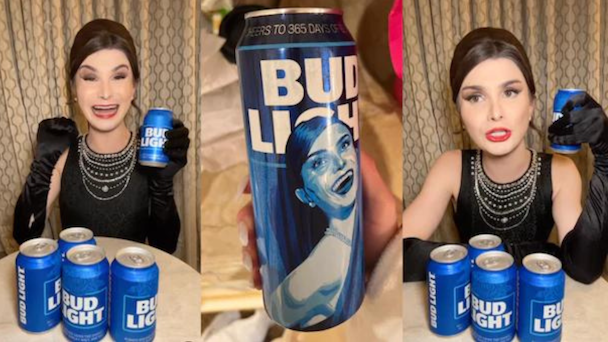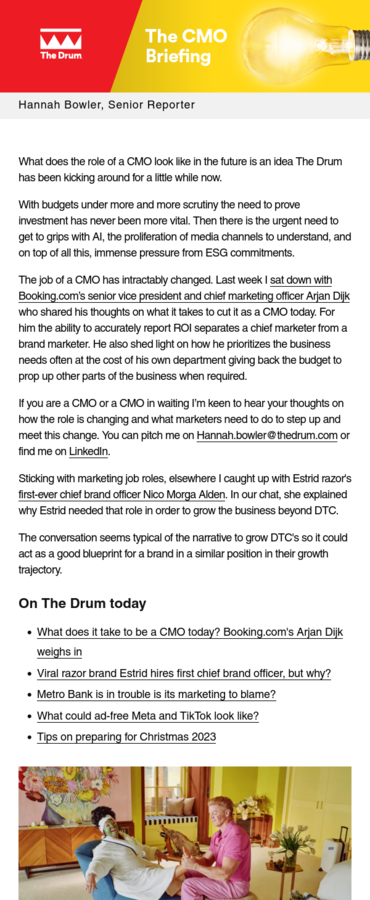Bud Light’s branding blunder continues after it puts marketing execs on leave
From ‘rainbow washing’ to Twitter’s unbans, Crenshaw Communications’ Chris Harihar takes a look at the fallout from Bud Light’s partnership with trans influencer Dylan Mulvaney and the lessons marketers can learn from it.

Anheuser-Busch has responded to backlash over its partnership with trans influencer Dylan Mulvaney / Credit: Dylan Mulvaney via Instagram
The Bud Light-Dylan Mulvaney controversy continues. Over the weekend, Alissa Heinerscheid and Daniel Blake, the two executives behind the commemorative beer can for transgender influencer Mulvaney, were put on leave. Bud Light’s parent company, Anheuser-Busch, has apparently held them accountable for the campaign and ensuing controversy.
The move followed a letter from Anheuser-Busch’s chief executive that essentially apologized for the activation. Though not explicitly saying ”I’m sorry,” it attempted to distance the brand from Mulvaney by invoking traditional Americana imagery and values – a revealing and distasteful move that othered Mulvaney to realign Bud Light.
Advertisement
Unsurprisingly, Bud Light’s conservative audience remains unforgiving, while the new demographic initially drawn by Bud Light’s support of Mulvaney has all but cut ties. I think it’s fair to call this one of the worst-managed PR and marketing crises of the past decade. As we examine the aftermath and long-term effects, consider the following crucial takeaways for brands, communication professionals and marketers moving forward.
Advertisement
The challenges of performative LGBTQ+ marketing
Last year, Pride campaigns faced Gen Z criticism for being superficial corporate activism. For instance, only 14% of respondents positively rated basic rainbow flag campaigns by brands. Bud Light’s situation exemplifies this kind of ’rainbow washing’ – organizations promoting superficial LGBTQ+ support.
Oddly, the Bud Light incident may make brands hesitant to engage in even shallow LGBTQ+ activism at a time when all forms of corporate support – amid a wave of anti-LGBTQ+ rhetoric and legislation – should be welcomed.
Nevertheless, brands engaging in LGBTQ+ marketing should try to prioritize genuine support over superficial stunts. While even hollow campaigns can foster acceptance, it is crucial to strive for meaningful partnerships and initiatives that resonate with the LGBTQ+ community. Importantly, brands must also stand by their decisions. Apologizing for alignment with the community is the worst form of rainbow washing.
Suggested newsletters for you
Not every backlash requires a response
Evidently, Bud Light was unprepared for the national, multi-day controversy that resulted from its collaboration with Mulvaney. However, it ignored a key communications principle to overcome such controversies – do not feed the trolls.
The company shouldn’t have halted social media posting or released a bland, distancing statement that only emboldened critics. Sometimes, silence is better – learning from the experience and moving on. Other brands, like Gillette, have demonstrated how to do this effectively. In 2018, it released a controversial spin on its ‘Best a man can get’ slogan, interrogating toxic masculinity. The outrage over the ad was likely expected as some claimed it “belittled men,” but the brand didn’t back down. It weathered the storm, embraced the good and bad, and largely persevered.
Twitter’s new role in anti-LGBTQ+ rhetoric and right-wing activism
The anti-trans, anti-LGBTQ+ campaign against Anheuser-Busch, Bud Light and Mulvaney gained traction alongside two notable changes on Twitter: the reinstatement of numerous previously banned accounts with a history of hateful LGBTQ+ commentary and the loosening of content safety rules.
These changes have also led to a surge in disinformation on Twitter in general and about the campaign’s impact specifically, with many claiming Anheuser-Busch lost $6bn in market cap due to the controversy. In reality, the stock has grown by nearly 40% over the past six months. If the Bud Light campaign had occurred before Elon Musk’s ownership of Twitter, it might not have reached the same level of controversy.

Moving forward, brands must consider this new paradigm, where conservative and right-leaning activism against brands on Twitter will likely be more common and potent, impacting media coverage and, as a result, their overall decision-making. The Bud Light-Dylan Mulvaney controversy underscores the need for brands to adopt authentic, strategic marketing and PR, and continuing that even in the face of controversy.
Chris Harihar is a partner at New York-based PR agency Crenshaw Communications. He recently published an op-ed in The Drum about the implications of rushing the AI arms race.


